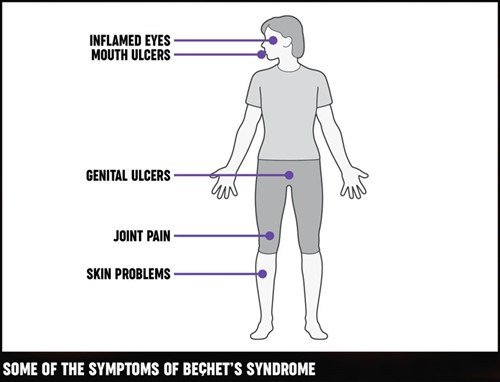Facts About Behçet’s Disease of the Eye
Behçet’s Defined
What is Behçet’s disease?
Behçet’s disease is an autoimmune disease that results from damage to blood vessels throughout the body, particularly veins. In an autoimmune disease, the immune system attacks and harms the body’s own tissues. This disease is also known as adamantiades.
Causes
What causes Behçet’s disease?
The exact cause is unknown. It is believed that an autoimmune reaction may cause blood vessels to become inflamed, but it is not clear what triggers this reaction.
Symptoms
What are the symptoms of Behçet’s disease?
Behçet’s disease affects each person differently. The four most common symptoms are mouth sores, genital sores, inflammation inside of the eye, and skin problems. Inflammation inside of the eye (uveitis, retinitis, and iritis) occurs in more that half of those with Behçet’s disease and can cause blurred vision, pain, and redness.
Other symptoms may include arthritis, blood clots, and inflammation in the central nervous system and digestive organs.
Behçet’s syndrome or Behçet’s disease (pronounced betchets) is a condition that causes a number of symptoms, including:
- mouth ulcers
- genital ulcers
- eye inflammation.
During pregnancy
Behçet’s does not appear to be linked to pregnancy complications, but the medications used can be harmful to the unborn baby. For this reason, it is best for any pregnancy to be planned and discussed first with a health provider. Sometimes a baby is born with neonatal Behçet’s disease. This is very rare and usually resolves itself within 6 to 8 weeks.
Treatment
How is Behçet’s disease treated?
There is no cure for Behçet’s disease. Treatment typically focuses on reducing discomfort and preventing serious complications. Corticosteroids and other medications that suppress the immune system may be prescribed to treat inflammation.
What is the prognosis for someone with Behçet’s disease?
Behçet’s is a chronic disease that recurs. However, patients may have periods of time when symptoms go away temporarily (remission). How severe the disease is varies from patient to patient. Some patients may live normal lives, but others may become blind or severely disabled.






7 Comments
Add Yours →A person necessarily lend a hand to make significantly articles I would
state. This is the very first time I frequented your website page and so far?
I amazed with the research you made to make this particular
post extraordinary. Magnificent task!
Howdy! This post couldn’t be written any better! Looking through this post
reminds me of my previous roommate! He always kept talking about this.
I most certainly will forward this article to him. Pretty sure he’ll have
a very good read. Thank you for sharing!
I’m not that much of a internet reader to be honest but your sites really nice, keep it up!
I’ll go ahead and bookmark your website to come back down the road.
Many thanks
Hello to every , as I am truly keen of reading this blog’s post to be
updated on a regular basis. It carries pleasant material.
Great post.
I am not sure where you’re getting your information, but great topic.
I needs to spend some time learning much more or
understanding more. Thanks for fantastic information I was looking for this information for my mission.
Hello! I know this is kinda off topic however I’d figured I’d ask.
Would you be interested in exchanging links or maybe guest writing a blog article
or vice-versa? My blog discusses a lot of the same subjects as yours and I think we could greatly benefit from each
other. If you might be interested feel free to shoot me an email.
I look forward to hearing from you! Excellent blog by the
way!Crocs Styleshttp://www.52ts.com/link.php?url=https://www.first-bookmarkings.win/jojo-siwa-crocshttps://www.bookmarkidea.win/fluffy-crocs-with-fur